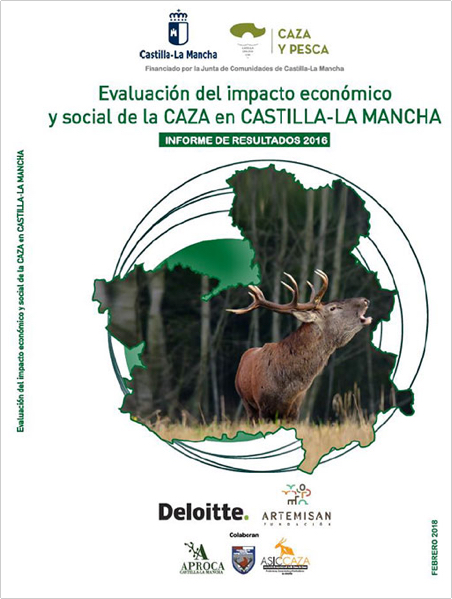Spain was originally known as “HISPANIA”, meaning “land of rabbits”. Nowadays, Spain is one of the main paradise destinations for international hunters, especially for European hunters due to its proximity. 87% of Spanish territory is hunting territory, which means 43 million hectares and 32,000 hunting grounds.
Hunting is the most widespread activity in Castilla La Mancha, since its practice occupies 90 % of the surface area of this community, thus directly influencing in a very positive way the conservation of wild and game species, as well as their habitats.
20% of the national hunting land is in Castilla la Mancha, as this is where the best biotopes for small game hunting and the best stable climates for the reproduction of small game species and other steppe birds are to be found. Hunting activity accounts for 0.3% of Spain’s GDP through expenditure of 6,475 million euros, with a tax return of 614 million euros and more than 186,000 jobs. These figures are so convincing that they support the need to promote this sector, which is key to rural development in most of Spain’s rural municipalities. Beyond the economic data, it is necessary to value the contribution of hunting, as recognised by the International Union for the Conservation of Nature and the European Union. For generations, hunting has played a silent conservation role, particularly in controlling overpopulation and disease,
care, management and conservation of the Natural Environment, in the maintenance of Protected Natural Spaces and, of course, in the reduction of the accident rate of agricultural damage and in the reduction of traffic accidents caused by game species.
Hunting and its sustainable management must be defended as an element of conservation and as an added economic value in the rural environment, as these hunting days of any of the modalities practised always generate a high level of economic activity in other sectors which also generate wealth and employment in villages and rural areas, making a significant contribution to the development of tourism and leisure in areas often threatened by abandonment and depopulation. Hunting has a very positive effect on the population roots; many hunters remain linked to their municipalities of origin thanks to being able to carry out this activity in their rural environment, slowing down an increasingly incipient rural exodus and helping to fix the population in the most disadvantaged areas.
Hunting is not only a leisure and sporting activity, nor is it just an activity with cultural connotations, but it is also a complement to traditional agricultural income, in many cases in a very significant way in large rural areas of an eminently rural region such as Castilla-La Mancha. There are numerous and varied hunting modalities practised in this area; activities such as hunting partridge, rabbit and hare in hand, traditional red-legged partridge shooting, hunting migratory birds in fixed hunting posts for wood pigeon, turtle dove, thrush, quail and duck, among others. The attractiveness of regional hunting has therefore generated a clear interest from Spanish and foreign hunters, which is reflected in a socio-economic impact that has always been rightly assumed to be important, but whose real magnitude has been unknown. Hunting has thus become an important economic activity in Castilla-La Mancha, a driving force for social and economic development in many rural areas. The contribution of the hunting sector to regional development has traditionally been ignored and reduced to the economic aspect and based on subjective estimates. It is necessary to know the wealth that the activity generates, its contribution and study in the different economic activities with the aim of adopting the pertinent decisions regarding its promotion and development, in the spirit of knowing exactly its influence. It was therefore necessary to address this shortcoming with the application of verifiable, objective methodologies, with concrete and real data that economically evaluate this activity. In accordance with the importance of this activity in the region and the need to know the reality of its impact on the social, economic and cultural spheres, the Junta de Comunidades de Castilla-La Mancha has commissioned this study to the consultancy-auditing firm Deloitte through the Artemisan Foundation. These pages have been drawn up taking into account three main aspects: firstly, the economic aspect, through the direct and indirect contribution of hunting activity, its contribution to GDP, the generation of tax returns and the generation of employment; secondly, the social aspect, through its involvement in cultural and educational and awareness-raising aspects; and thirdly, the environmental aspect, which includes the contribution of hunting activity to the environment. Secondly, the social aspect, through its involvement in cultural and educational and awareness-raising aspects; and thirdly, the environmental aspect, which includes the contribution of hunting activity to the conservation of habitats and species and of natural resources in general. It has therefore been an ambitious project that provides real and verifiable, objective data, which will help policy-makers to implement policy.
The aim is to ensure that the hunting sector understands the full extent of its reality, and therefore the adoption of measures and actions of vital importance for the future of the hunting sector.
Here is the impressive result of the evaluation of the economic and social impact of hunting in Castilla la Mancha in 2016, a very interesting and surprising result.
